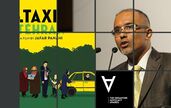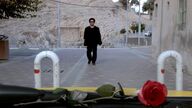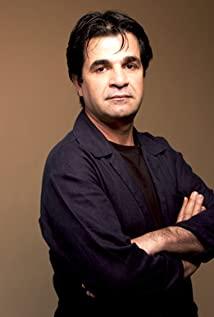The first work I came into contact with Jaffa Panasi was "Circle of Life" in 2000, and "This Is Not a Movie" and "Closing" after being blocked by the Iranian government. The previous one was about seven women in a day. The sad story, the last two are Jaffa’s own life in confinement. In "Circle of Life", all women who have a relationship with the prison cannot escape the deteriorating situation in life. The door frames, window frames and fences that appear repeatedly in the film are the epitome of women's encounters, still in the frame. There is no causal relationship between the few short stories, just because of the accidental encounter in life. The woman who gave birth in pain at the beginning of the film is already in prison at the end of the film. It seems that the child born does not match the gender of the ultrasound. As Roger Ebert said, the reason why this movie with no violence, no pornography, and no alcohol can offend the Iranian authorities is that Jaffa’s lens exposes the situation of Iranian women as prey, and the society as a whole. They are their natural enemies, just because they are women. In such a society, no woman can escape the circle of fate. In the next two films, Jaffa has been convicted of "endangering national security" and "implementing propaganda against the Islamic Republic". For 20 years, it is prohibited to make or shoot movies, write scripts, accept any media interviews, and leave the country. In this case, the film is restricted to the smallest space-time range, and can only insist on confrontation in self-presentation.
Based on these three films, I once thought that this was Jaffa's style, a serious director who "exposed the dark side of society". It was not until later that I watched "White Balloon" and "Who Can Take Me Home" again, and was deeply moved by the innocence and purity of the children in the children's film, that he fully felt his artistic style in different periods. This feeling is probably also in line with the overall impression of the two different temperaments of Iranian movies. On one side is the childlike innocence of "Little Shoes", which completely melts the embarrassment of life in innocence and warmth, and on the other is the Iran in "A Farewell". , Even the middle class with a house and a car have to constantly seek a way out in a precarious situation. Between innocence and embarrassment, between the secularization of daily life and the authority of nationalism, Iran in the film faces a huge break.
From "This Is Not a Movie" to "Taxi", "selfie" has become Jaffa's method and theme at the same time. In the days when filming was restricted, the relationship between seeing and being watched was reversed in the process of observing oneself. Filming oneself was not only a political protest, but also a reconstruction of the worldview of the image. Different from the dullness of "This is not a movie" and "Closing", "Taxi" changed the enclosed space from an immovable room to a mobile interior space, and transformed the small interior space into a display of Iranian society. tower. Although as early as 2002, Abbas used a taxi and a fixed lens to shoot feminist works featuring an Iranian female driver as the main character, but under Jaffa’s personal appearance, the identity of the fake driver and the real director still made " "Taxi" is more interesting than Abbas's "10". More importantly, in this documentary film that is difficult to distinguish between true and false, Jaffa has already demonstrated the image value of using fandom to fight power from his "self-portrait".
There are a total of four fixed lenses in the whole movie, which are aimed at the driver, co-driver, rear seat and front window. In the first two seats, the director's "dispatching" of the lens can be clearly seen. In addition, there are the images of the injured man dictating the will taken by the passenger Omid using Jaffa's mobile phone, the images taken by the niece Hannah with the card machine, and the surveillance video shown to Jaffa on the iPad by the old neighbors who cannot be seen by the audience. Regardless of whether it is a fixed lens or a handheld image, all the images are always "surveilled", and the "surveilled" images are used to metaphor the difficult situation of Iranian films.
The three groups of double passengers, the male thief and the female teacher, the couple in a car accident, and the old woman rushing to release the goldfish in the river, deal with topics that point to society, family, and religious beliefs. A male passenger who is a thief believes that stealing is also right. For those who have no bottom line and steal even the poor, they should be put to death if caught. Female teachers believe that the death penalty and high-pressure policies have never been the fundamental motivation to change Iran. The husband was in a car accident, and after being carried into the car, he asked to make a will with the image and leave the property to his wife. Otherwise, once he died, the property would fall into the hands of his brother and the wife could only sleep on the street. The old women who rushed to release goldfish in the river believed that this was the only way for them to live a long life-before noon on their birthday each year, they would release the goldfish caught in the river in the previous year, and at the same time they would catch another pair. , So that Allah will bless them.
Apart from these passengers who routinely showcase Iranian society, the most interesting is the phantom passenger drawn by the identity of director Jaffa. Omid is a businessman who produces and sells pirated discs. He naturally recognized Jaffa as soon as he got on the car, and he identified the final dialogue between the male thief and the female teacher and the final part of the director’s work "Crimson Gold". The scene of a cafe is very similar. Omid touts himself as a bridge of cultural exchanges between the East and the West. Without him, the Iranian people would not have seen The Walking Dead and Woody Allen, or even Jaffa's works that were banned by the government from being distributed. Omid’s delivery of the disc happened to be young people studying movies. For both of them, seeing Jaffa was a once-in-a-lifetime opportunity, so Omid lied that Jaffa was a partner, but the young man took the opportunity to ask for advice and couldn’t find it. The age-old problem of shooting themes. When niece Hannah got in the car, the difficulties encountered by elementary school students' short film assignments brought more discussions about images and reality. Hannah had already filmed the cruel love experience of the sister next door, but because the content was not suitable for public screening, she could not use it. In the publicly screened films, women must wear veils, decent characters must not wear ties, men and women must not have contact, and cannot be miserable. The scenes of life and violence, cannot involve political and economic topics, and so on. Hannah's distress comes from her ignorance of the boundaries between "spreading dark thoughts" and "seeking truth from facts but not involving the truth", let alone how to distinguish between "real" and "unreal" in images. In the surveillance video shown to Jaffa by the old neighbor, he was beaten and robbed. What surprised Jaffa was that he not only failed to call the police, but also sympathized with the perpetrator. If he were not desperate, no one would choose to do evil. What he hopes is that these surveillance videos can one day become film material. High pressure cannot change Iran, but the images may be.
Jaffa’s directorship and film works have been repeatedly mentioned by fans of fans. For them, Jaffa has become an object that can be quoted constantly. It is not that the film replicates life, but that life always confirms the film, the truth and the fiction. The position of time is reversed again. Although young Hannah was just completing a school assignment, she was forced to start participating in a strict self-censorship mechanism. Her uncle Jaffa has found her own video politics. Only the "reality" of images can fight the "reality" of power, but she still has a long way to go. At least in Iran, to become a real director, she must get Find your own "truth".
The last passenger was Nasrin Sotod, a well-known Iranian human rights lawyer. When she got off the bus, she drew a sprig from the delicate rose in her hand and gave it to audiences around the world in front of the camera. She said that filmmakers are worthy of being relied on. . Maybe we can also believe like Jaffa that the contradiction between nationalism and modernization will one day break out in the shadows.
This article has been published in "Beijing Youth Daily"
View more about Taxi reviews







